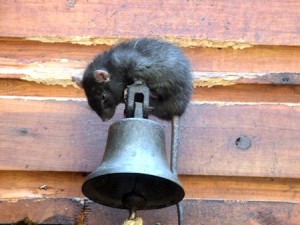Hardly a week goes by without rats featuring in the news – restaurants being closed down, infested homes being evacuated etc.
It is said that you are never more than 6 feet away from a rat, so huge is the population of the rodents in the UK. Estimates vary hugely from 10 million to 80 million.
 Rats are insanitary creatures which carry diseases and have been known to bite. They will eat anything they can find, and will chew through anything in their way, such as power cables and breeze blocks. They will nest in roofs, cellars, walls, anywhere in fact, and one pair can produce up to 14 offspring every 15 weeks. They are nocturnal, and can make a great deal of noise throughout the night. As if their mere presence isn’t hazardous enough, damage they cause to property can cause power failures and even fires.
Rats are insanitary creatures which carry diseases and have been known to bite. They will eat anything they can find, and will chew through anything in their way, such as power cables and breeze blocks. They will nest in roofs, cellars, walls, anywhere in fact, and one pair can produce up to 14 offspring every 15 weeks. They are nocturnal, and can make a great deal of noise throughout the night. As if their mere presence isn’t hazardous enough, damage they cause to property can cause power failures and even fires.
Recently, there has been an upsurge in occurrences of so-called ‘Super Rats’, due to their size and resistance to the usual poisons. A Swindon-based Pest Control Firm just this month found a rat over 20 inches long and in Kent, a resident took a 24 inch dead rat to the Council Office to prove there was a problem.
Although the number of sightings of rats has increased, is this due to a proportionate increase in their population, or simply that the rats are getting bolder? There is no doubt that the usual poisons are becoming less effective and that there is less council money to tackle the problem. Also, rats will follow the food trail, and there are richer pickings to be found in towns and cities. Where there are more people, there is more food, and there will be more sightings.
As long as there is ample food available, rats will keep eating and keep growing. Rats are intelligent, and have seen that people are wasteful – rubbish bins overflowing, litter pushed into hedges – all signs of something more to eat. Even bread put out for the ducks at a pond in Chislehurst has been attracting rats, to the consternation of locals.
There is much that we can do to curtail the growth of the rats. Disposing of food waste in a responsible way, blocking entry routes to buildings effectively, storing foodstuffs properly, reporting sightings to the local council – all these measures can help.
There is a shortage of housing in this country, so it seems a shame that council properties which should be occupied by families, are being left empty simply because the councils don’t have the money to eradicate the rats effectively. This has a knock-on effect on house prices in these areas, and possibly on the health of the people who live there.
PP Â Â Â Â Â Â Â Â Â Â Â Â Â Â Â Â Â Â Â Â Â Â Â Â Â Â Â Â Â Â Â Â Â Â Â Â Â Â Â Â Â Â Â Â Â Â Â Â Â Â Â Â Â Â Â Â Â Â Â Â Â Â Â Â Â Â Â Â Â Â Â 02.02.15

